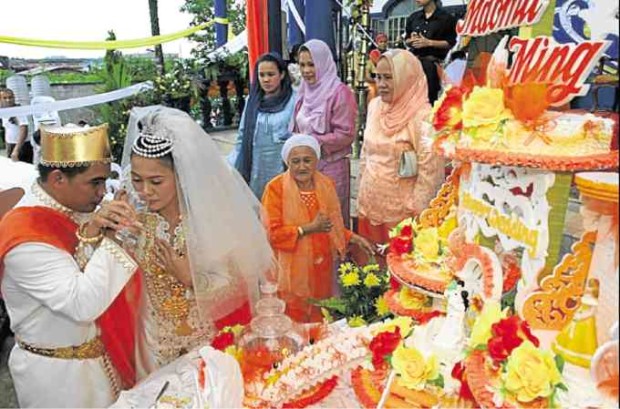My love story’s not complicated. Just imagine the movie, “My Big Fat Greek Wedding,” with so many people involved in the courtship and expressing contrary opinions, and two cultures clashing big time.
Eleven years ago, I would have rejected expectations that I would marry the ideal mate: a nice, Muslim faithful descended from a long line of datus. I used to be a nonconformist and thought I’d be an outcast in a community where women raced to have a big brood, usually before they hit the age of 25. Still, I noted that the so-called “old maids” among us were increasing in number and were relatively well-off, happy to be free from limitations imposed by male partners and able to drive off to Boracay or abroad at the slightest excuse.
Could I find a man who’d match my free-spirited life of travel and freelance work, and still conform to society’s expectations of Muslim women?
Meranao code
Hayy (his Hajj name) comes from a Maranao family, like mine. But while he stayed in the province his whole life, I had stayed in Jedda, Saudi Arabia, since birth. His dad was a sultan and his family based in Lanao. My family spent most of their time in Manila or working with the Philippine Embassy abroad.
But our common roots brought us together.
Though I grew up in Saudi, I had a basically ethnic Maranao upbringing: no boyfriends, male company only with chaperones around, no cursing, protect yourself and follow the Meranao code handed down for generations which determines the standards of honor and shame.
In the 1980s and among my African girlfriends, I freely expressed myself—head-banging ala Madonna, leggings, big hair, Paula Abdul. I wanted to become a TV host, dreamt of meeting Prince Charming and taped romantic songs.
But back in the Philippines, at UP Diliman, all those starry-eyed ideas broke down. Deconstruction meant questioning one’s self and the rules one lived by. Was there really a perfect guy? I had crushes and fell secretly in love with a boy in Baguio but with the code haunting even my sleep, my heart could not fully commit to anyone.
I tried to join UP Law, was asked why not take Shariah in the interview, and failed. In my Muslim get-up, I could not enter broadcasting companies. So I went to Marawi City, my parents’ native land.
Isolated
Marawi is a community where everyone knows everyone, where some plates are shared by two at meal times using their hand on every morsel. Everyone who passes the board or civil service exams is treated to a fiesta and a tarpaulin posted on almost every corner, depending on how many cousins or uncles acted as sponsors.
I became part of this community isolated by so many modern things—no malls, no parks, no cinemas, weak and spotty Wi-Fi. A community of poor but proud people. With my newfound ideas about freedom and justice, not all of which can be applied here, I was bound to stay single.
Fortunately, my parents may have broken the mold when they married outside their social circles. My mother’s parents were from political clans, while my father came from a clan of professionals.
I met Hayy long after he had met me—when we were in our 20s, he said, and he saw me stepping out of a car in Marawi which I visited while I was in college. Even then, he said, he knew I was the girl he wanted to marry.
As dating was discouraged here, he courted me by getting through my friends and family, even spending endless hours of coffee time with one particular girlfriend until midnight. It took three months for him to woo everyone in my circle.
The Maranao courtship protocol starts at “first sight,” the visitation to the girl’s house where the suitor or his representatives express his intention or interest to court and marry the girl. She may not be around, but as a confessed feminist, I faced him and his entourage of elders and supporters, an intimidating sight.
Then there’s the meeting between representatives of both parties where they agree on the dowry and engagement schedule. A dowry, which can range from P150,000 to P1 million cash and is supposedly a gift for the girl, is instead spent on the wedding. Among religious families, it (the dowry) could even be a prayer.
Dialaga
The third stage is a pre-wedding formal ceremony called dialaga where loads of sweets are basketed and brought by the suitor’s convoy to the girl’s residence (or, these days, to a function hall because of the many attendees).
The last stage is the wedding itself. Held in our house, it meant whirlwind preparations as we had only two weeks to prepare. My friends from Manila flew in to join a guest list of 1,000 and my entourage in orange. Meanwhile, the groom’s convoy of balloon-bedecked cars filled the streets to inform the public that the grand day was May 22, 2004.
During the pre-engagement period, I was silent which, in Maranao tradition, meant accepting the suitor. The visitations allowed us to get to know each other. In our differences, I saw in him a similar sense of caring and connectedness with the community. A wedding of two people here also means a wedding of two clans.
After the wedding, we continued to discover each other. The relationship is a work in progress and we pray that having a baby deepens our resolve and commitment.
